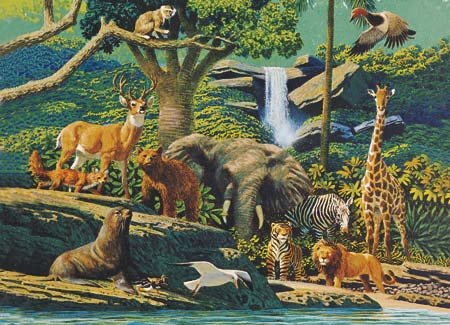Integral to organic evolution is the concept of inheritance.
Inheritance, in this sense, relates to the passing down of traits from one generation to the next by means of reproduction.
If traits are not be passed down, from one generation to the next, using a relatively predictable mechanism, then the genome of a species would be too fluid.
Under these circumstances, new mutations or genetic recombinations, whether beneficial or not, would have little lasting effect.
The process of natural selection and even artificial selection would not function and would not produce, over many generations, desirable enhancements to a species or render them more suitably adapted to a changing environment.
The notion of inheritance makes its appearance already in the first chapter of Genesis.
All the plants and animals, including humans, are to be fruitful and multiply and to bring forth after their kind, to thereby replenish and fill the earth.
We see the notion also relating to behavioural traits in Exodus...
...visiting the iniquity of the fathers upon the children, and upon the children’s children, unto the third and to the fourth generation.
...relating to how often children will follow in their parent's footsteps and thereby reap the same consequences for generations.
Later in the New Testament, we find the principle of inheritance relating to actions and resultant consequences in the familiar phrase...
...for whatsoever a man soweth, that shall he also reap.
The scriptures paint an early picture for the notions of determinism where A leads to B and B to C if there is no intervening change.
The consequences of the fall devolve upon the whole of humankind as a result of the actions of Adam in Eden, but similarly the remedy or redemption from the fall comes by way of one man.
Just as Adam was no ordinary man, so the remedy would require a Redemer who was no ordinary man, possessing no ordinary traits through inheritance.
From Mary the mother of Jesus Christ, he would inherit mortality or the ability to die. From His Father, even God, Jesus would inherit immortality, even the ability to live forever.
Being the inheritor, by birth, of both of these traits he would have power over death and be able to bring about the redemption from death.
Those who accept Christ as the Redeemer but question his divine sonship miss the role of inheritance in this aspect of his divine mission.
``
Previous parts of this Series.
Were the seven days of creation in Genesis seven twenty four hour periods? - Delving a little deeper
Were the seven days of creation in Genesis seven twenty four hour periods? - Into the detail
Were the seven days of creation in Genesis seven twenty four hour periods? - Some conclusions
Were the seven days of creation in Genesis seven twenty four hour periods? - Some more conclusions
Were the seven days of creation in Genesis seven twenty four hour periods? - The implications.
The evolution of Adam - a conundrum
The evolution of Adam - Who is Adam
The evolution of Adam - Two trees and choice
The evolution of Adam - Partaking of the fruit and feeling naked
The evolution of Adam - Was there death before Adam

